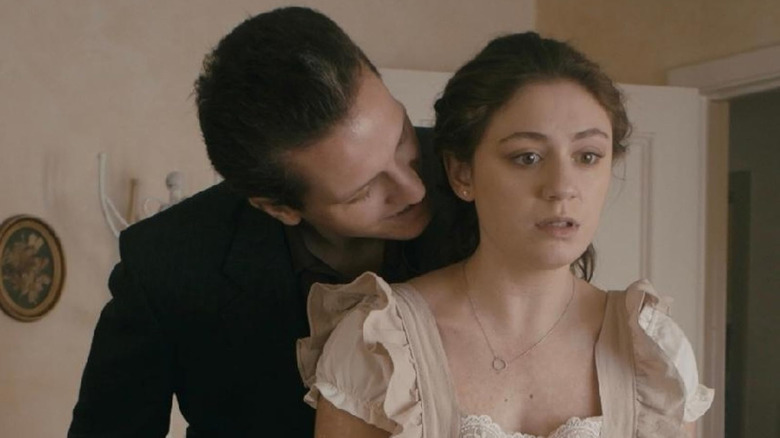What's A Microdrama And Where Can You Stream Them?
The entertainment industry has been trying to find ways to make this work for many years, and it may finally have caught on. Is there a way to use an app or the internet to distribute very, very short and easy-to-consume live-action dramas, ready to be consumed — on phones — in public? Some of us may be old enough to recall the early days of 1990s internet dial-ups and the phenomenon of filmmakers shooting and posting serialized shorts or short-form shows online exclusively. Even David Lynch got in on the action, making series like "Frownland." Lynch's films existed behind a paywall, however, and were seen as painfully exclusive.
In the mid-2000s, the notion of the "webisode" entered the lexicon. TV distributors would slice up half-hour sitcoms into three-minute portions and release them serially online. That was mocked at the time, as many felt that their attention span hadn't grown so short that they couldn't take in 22 full minutes of a TV series. And then, of course, there was Quibi, an ambitious and well-moneyed media venture that was only available on phones. It was essentially its own TV network and movie player that showed all-original media, all made by notable actors and filmmakers. It was roundly mocked at the time and shuttered after only five months. Many blamed COVID-19 for Quibi's failure. Why watch phone-only media when you're stuck down at home with your TV?
But it seems that short-form vertical media, mainly intended for consumption through phones, is working again. Variety is reporting that phone-only shorts are making huge amounts of money for the likes of DramaBox, ReelShort, and FlareFlow, companies that call their shows "microdramas." Not only that, short form vertical dramas (SFVDs) are apparently providing more work for actors and writers these days than mainstream studios.
Aren't microdamas just Quibi shorts? Yes, but they're working now
The shows offered on the above services are all technically full-length feature films, only chopped into two-minute shorts that end with a cliffhanger. They are shot on the cheap, with Variety noting that a typical SFVD only costs about $200,000 to make, and they are produced as quickly as possible. DramaBox, ReelShort, and FlareFlow all have hundreds of original titles to choose from. A quick perusal of their respective libraries also reveals that the vast bulk of current SFVDs are salacious soap operas with titles straight out of true-crime magazines. The titles are efficient and describe the premise: "Dear Professor, You Are My Baby Daddy" is on ReelShort. "Christmas Homecoming of My Trillionaire Husband" is on DramaBox. "Married in Secret, Loved in Excess" is on FlareFlow. The stories often feature female protagonists and center on romantic storylines.
These short-form soaps got their start in Asian markets, but they've massively infiltrated North America in recent years. Because they are so cheap to make, it's easy to flood a streaming service with content and charge a nominal subscription fee for a profit. An ad on the ReelShort website depicts a customer watching SFVDs in the elevator, standing around at a party, and strolling next to a pool. If you have two to four minutes to yourself, you can dive into a lascivious melodrama toute de suite. In practice, SFVD's might more closely resemble the old-school soap opera comic strips one used to see in the newspaper ("Apartment 3G," and the like). They are little, tiny pieces of longer, overwrought dramas.
Their success also proves that Quibi was just ahead of its time. It seems that people are eager to find short dramas in public.
Actors and writers are flocking to microdramas
The Variety article points out that these microdramas are a big enough business to provide plenty of work for lots of working actors, many of whom lost out on job opportunities during the COVID-19 lockdowns and then the (to be clear, highly necessary) joint 2023 actors and writers' strikes. Performers have to pay the bills, of course, and these microdrama companies are happy to provide paychecks.
This is significant because these companies don't require union members. They are being made entirely outside of the purview of the Hollywood system and just happen to be making a lot of money. Hollywood has a stranglehold on whatever monoculture may be left, but companies like DramaBox, FlareFlow, and ReelShort are proving that outsiders can make a splash. Indeed, many SAG/AFTRA members are secretly starring in these SFVDs, risking censure, just to put food on the table. The lure of plentiful production, fun, over-the-top stories, and steady paychecks is far more alluring than big-money Hollywood, itself ever stingier about pay, regular work, and royalties.
According to a DramaBox writer named Adrion Trujillo (quote by Variety), professional Hollywood writers even pen scripts for DramaBox under pen name:
"There are union workers who will work under pseudonyms. [...] I went from submitting to contests to working next to 'Game of Thrones' writers. There were a number of writers on our team. The majority were not using their real names."
Because it's not union work, the rates remain incredibly low, and artists aren't protected from exploitation. But sometimes a paycheck is a paycheck. The microdrama studios focus on volume above all else, and they haven't wanted to discuss unionizing. And it's only helping them. This may be the immediate future of entertainment.


